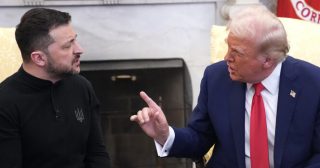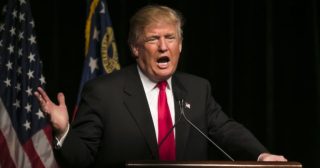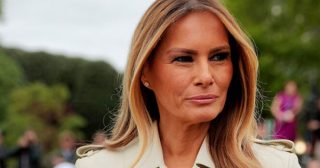Trump Could Be Removed from the White House Over One ‘Unpredictable’ Move
Donald Trump’s return to the White House has been anything but smooth. Leaked messages from a private Signal group have stirred controversy, raising serious concerns about his leadership. But while his critics outside the administration continue their attacks, could his biggest threat actually come from within his own ranks?
According to veteran political analyst Adam Boulton, Trump’s greatest challenge might not be the Democratic opposition—it could be his own Vice President, JD Vance.
Boulton suggests that Trump’s erratic leadership style could backfire, pushing his allies to look for an alternative. Writing in The i, he noted, “Should Trump become more of an unpredictable liability—tanking the economy with tariffs, say, or pushing America into an armed confrontation with an ally—then Republicans, including cabinet members, may decide that his comparatively squeaky-clean, family-oriented VP is a better bet to keep them in power.”
Trump’s Controversial Moves Are Fueling Internal Tensions
Since reclaiming the presidency, Trump has wasted no time making bold—some say reckless—decisions. He’s imposed tariffs on key allies like Canada and Mexico, temporarily cut aid to Ukraine, and even ordered the deportation of Venezuelans to El Salvador.
One particularly bizarre moment involved his administration renaming the Gulf of Mexico, while another saw him take an aggressive stance toward Greenland, sparking speculation about his territorial ambitions.
These unpredictable moves have reportedly unsettled some of his closest allies, leaving them wondering if they should back a more stable alternative—namely, JD Vance.
JD Vance: Trump Loyalist or Political Opportunist?
Vance, the former venture capitalist and author of Hillbilly Elegy, once blasted Trump, even calling him “America’s Hitler.” But over the years, he’s undergone a remarkable transformation into one of Trump’s most vocal defenders.

That loyalty took a hit recently after leaked messages from a private Signal chat exposed Vance’s subtle criticism of the president. The messages, obtained by journalist Jeffrey Goldberg, show Vance questioning Trump’s contradictory foreign policy positions.
“I am not sure the president is aware how inconsistent this is with his message on Europe right now,” Vance reportedly wrote, referring to Trump’s calls for a unilateral U.S. attack on the Houthis while demanding that European nations shoulder more defense responsibilities.
The revelation has fueled speculation: Is Vance truly loyal, or is he positioning himself as Trump’s replacement?
Is America on the Brink of a Political Crisis?
Concerns over Trump’s leadership come at a time when U.S. democracy is under intense scrutiny. Political scientist Staffan Lindberg warned, “The USA now seems to be heading towards a transition away from democracy under President Trump. The reverberations of this are and will be enormous across the world.”
Tara Setmayer, a former Republican communications director, echoed these fears, telling The Guardian, “We are approaching Defcon 1 for our democracy, and a lot of people in the media and the opposition leadership don’t seem to be communicating that to the American people. The biggest danger is the normalization of it.”
Adding to these concerns, reports emerged of a French scientist being barred from entering the U.S. after border officials found messages on his phone criticizing Trump’s research policies. France’s Minister of Higher Education condemned the move, calling it an attack on free speech.
How Trump Could Be Removed from Office
If tensions within the administration reach a breaking point, Trump could be ousted through several possible avenues.

- Impeachment – Though Trump survived two impeachment trials in his first term, a third attempt could gain momentum if Republican lawmakers turn on him.
- The 25th Amendment – Vice President Vance and a majority of Trump’s cabinet could declare him “unable to discharge the powers and duties of his office.” Trump would have the right to contest this, but if two-thirds of Congress agrees, he’d be permanently removed.
- Resignation – While unlikely, pressure from within the party could push Trump to step down, similar to Richard Nixon during the Watergate scandal.
Would a Vance Presidency Be Any Different?
If JD Vance were to replace Trump, it’s unclear how much would actually change. While some conservatives see him as a stabilizing force, others worry his shifting stance on Trump suggests he might be just as unpredictable.
One thing is certain: The Trump White House remains as volatile as ever. Whether Trump holds on or Vance emerges as the GOP’s new leader, all eyes will be on the unfolding power struggle within the administration.










